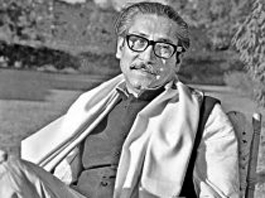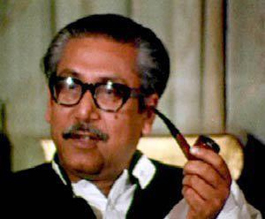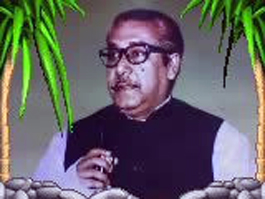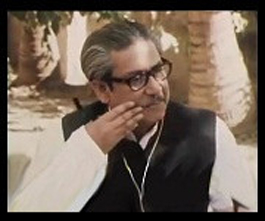Lawrence Lifschultz has been writing on Bangladesh in diverse journals and newspapers from the Far Eastern Economic Review (Hong Kong) to The Guardian (London), the Economic & Political Weekly (Mumbai), and The Nation (New York) for nearly four decades.
 In this recent interview with Anisur Rahman, Chief Reporter BSS, he reflects on his first meeting with Sheikh Mujibur Rahman in 1970 and the events surrounding Sheikh Mujib’s death. Lifschultz once again brings new details of this tragic history to light. (Special to The Daily Star)
In this recent interview with Anisur Rahman, Chief Reporter BSS, he reflects on his first meeting with Sheikh Mujibur Rahman in 1970 and the events surrounding Sheikh Mujib’s death. Lifschultz once again brings new details of this tragic history to light. (Special to The Daily Star)
Anisur Rahman (AR): Could you recall your personal memories of Bangabandhu during your Dhaka visit in 1970?
Lawrence Lifschultz (LL): The first time I visited Dhaka was in July 1970. I travelled overland to East Pakistan from Kolkata via Benepole and then on to Dhaka by road and ferries.
The previous year I had lived in Gaya District in Bihar working on a rural agricultural development project run by the Sarvodaya Movement founded by followers of Mahatma Gandhi. I came to India when I was 19 on a programme sponsored by Yale University where I was an undergraduate. It was known as the Five Year BA Fellowship.
It was a remarkable programme because it encouraged those who were selected for the Fellowship to get jobs with organisations working in the third world that were seeking to make a difference among the poorest communities of the world.
After this year in India I began a six-month journey through southeast Asia. Most of my time in this period involved a long road and boat trip through Vietnam, Cambodia and Laos at the height of the Indochina War but the first stop on my journey was East Pakistan (of the time). When I arrived in Dhaka, I found a very inexpensive hotel in the Old City. I began exploring Dhaka. One day I made my way to New Market to find a pharmacy to buy some medical supplies.
When I entered New Market, I was asked to sit and have a cup of tea. A member of the family who owned the pharmacy was a man named Nurul Huda. Nurul was absolutely appalled I was living in this cheap hotel in the Old City. I told him my philosophy was to travel as simply and inexpensively as possible. I insisted that in this way I would get a better view of the world and the societies that I passed through on my journey.
Huda Sahib said that was a very good philosophy, but he insisted that I come stay with him and his family in Banani. Ultimately, he persuaded me to take up his offer and I lived with his family for several days before continuing my journey onto Chittagong. The Huda family were very gracious to me.
During our first meeting in New Market and after listening to my descriptions of life in southern Bihar, Nurul Huda told me he wanted me to meet someone. He didn’t say who it was at first. He just told me to get on the back of his motorcycle and we would we see if the man he wanted me to meet was at home. I think my comments about Jayaprakash Narayan, one of the Gandhian leaders I had come to know, and the village level work I had been doing in Bihar intrigued Nurul Huda. I suppose I wasn’t your typical tourist in South Asia.
Nurul Huda drove me to Dhanmondhi and we dismounted at Sheikh Mujibur Rahman’s house. He asked Mujib’s staff to call Sheikh Mujib and explained to them that he wanted to introduce a foreign visitor to Sheikh Sahib. Mujib came out to greet me. Nurul and Mujib clearly knew one another. He explained to Mujib how we had met and what I had been doing in India. Mujib greeted me warmly and invited me in. Nurul drove off. Mujib and I went up to his study.
I knew something about the political situation in East Pakistan but at that stage I was not well informed. However, I knew enough to be able to ask questions. Mujib and I spoke over an hour and that soon turned into an invitation for lunch. We had a rather interesting conversation. He asked me a great deal about the project I had worked on in Bihar and my impressions of Jayaprakash Narayan.
In response to my questions he explained to me the Awami League’s political platform and the hope that elections would finally bring the necessary reordering of economic and social priorities that had been impossible to achieve during years of military dictatorship.
I recall asking Mujib what his views on socialism were. He described himself as essentially a social democrat and indicated his admiration for the accomplishments of countries like Sweden that had addressed the issue of economic deprivation within the framework of economic planning and a democratic society based on strict adherence to elections.
What I remember all these years later is how the conversation proceeded in a relaxed, casual and unhurried manner. Mujib was very much at ease. He was enjoying our talk. In this meeting there was no trace of any arrogance or self-righteousness. Moreover, as I look back I’m also struck about the kindness and hospitality that was involved in sitting with a young traveller, simply exchanging ideas.
For me, the irony is that in July 1970 I sat for two hours quietly talking with a man I had never met before but whose death would come to preoccupy me five years later. After his murder in the same house where he served me lunch, I would be drawn into an investigation as a reporter and a journalist trying to unravel and piece together the myriad linkages that went into the making of the coup d’etat that took his life and so many others on August 15, 1975.
AR: Can you recall how you came to know about the August 15 assassinations? What was your reaction at that time?
LL: In July 1975, I arrived in New Delhi to take up my position as South Asia Correspondent of the Far Eastern Economic Review. During 1974, I had lived for a year in Dhaka as the Review’s Bangladesh correspondent. The Review was a remarkable magazine in terms of its quality of reporting and the exceptional knowledge of much of its staff.
It is unfortunate that The Wall Street Journal, which bought the Review ultimately destroyed it, due to Dow Jones’ insular and American centric approach to reporting. But that is another story. When I worked at the Far Eastern Economic Review, it was one of the best jobs in the world for a young reporter in the way its senior editors encouraged in-depth reporting and recruited writers with critical language skills who also possessed extensive knowledge about the regions they were writing about.
On the morning of August 15, 1975, I was seated with other reporters at the Red Fort in New Delhi attending India’s Independence Day celebrations. Indira Gandhi was there that day and had begun her Independence Day speech. It was a tense and controversial time. This was the time of the Emergency and more than a hundred thousand of Ms. Gandhi’s opponents were under arrest. This also included the Gandhian leader, Jayaprakash Narayan.
While listening to Ms. Gandhi’s speech, a messenger from Reuters news service found me in the press section. He had a telex for me from my Editor, Derek Davies, in Hong Kong. It said that Mujib and his family had been killed by army personnel. In those days my office in Hong Kong communicated with Review correspondents through local Reuters’ offices. The telex instructed me to proceed to Dhaka immediately to report on what happened.
The Reuters messenger looked at me. “It’s terrible,” he whispered. I said, “Yes. It says the whole family has been killed.” He nodded. I touched the elbow of my companion, showed her the telex, and said we had to leave. Following my friend from Reuters we made our way out of the Red Fort. I made immediate preparations to depart for Dhaka.
AR: Following a long delayed and a protracted trial process, twelve leaders of the 1975 coup d’etat were tried. However, six of them are still absconding. Is it your opinion that there were others who were involved in the coup in addition to the junior military officers who faced trial? What is your assessment of General Ziaur Rahman’s role? Do you think Zia knew before the coup about the plans of the “young majors?”
LL: The evidence clearly points to the fact that General Ziaur Rahman had prior knowledge to the coup d’etat of August 15, 1975. In an interview with Anthony Mascarenhas, Faroque and Rashid, described their meetings with Zia prior to the August coup. Mascarenhas undertook these interviews for a “World in Action” programme that was broadcast in England on ITV a year after the coup. Mascarenhas also included excerpts of these interviews in his book A Legacy of Blood.
In 1997, I met Rashid for several hours in a European city. One day I will describe this meeting in much greater detail. Of course, among the various issues we discussed we spoke at great length about the 1975 coup that Rashid ostensibly “led.”
Rashid had his own reasons to want to meet me at that stage and the initiative for the meeting came from him. I was contacted in London by people who knew Rashid. I was told he wanted to meet me. We arranged through intermediaries the time, the city and the precise location where I would meet him. We did not meet in London. But, as I left London I was stopped by two Special Branch officers who made clear to me they knew where I was going. Obviously, the preparations for my trip were being monitored by the British. I was not particularly surprised. When I met up with Rashid, I went over with him exactly what he had told Mascarenhas about Zia’s involvement.
Rashid confirmed to me the accuracy of his interview with Mascarenhas. In our discussion, he added more details. He told me that he had met General Zia numerous times prior to the coup and that Zia was fully in the picture. It was “one plan” with different men playing different roles at many different levels. It is wrong to think of Rashid, Mustaque and Zia separately. They were part of one operation that had many moving parts. Indeed, the protection and the diplomatic positions offered to the associates of Majors Abdur Rashid and Faroque Rahman during the Zia and Ershad years are intimately linked to an effort to quiet the Majors, over a prolonged period in which tensions ebbed and flowed between various overt and covert actors who had participated in the August coup d’etat.
In a recent interview with General Shafiullah, Chief of Army Staff in 1975, I learned that in the days after the coup Shafiullah was uncertain whether he would be killed because he had ordered General Khaled Musharaff, the Chief of General Staff to attempt to stop units participating in the coup when first reports of a coup “in active progress” reached him. Mujib was still alive at that point. Shafiullah told me that he spoke to Mujib over the telephone shortly before Mujib was killed urging him to flee his house while Shafiullah attempted to organise loyal forces to bring the situation under control. Clearly, Shafiullah was not successful. But, why he was not successful is also an important story and this brings us once again back to Ziaur Rahman.
After Mujib was killed, Shafiullah was held under virtual house arrest for several days at Bangabhavan. According to Shafiullah, during this period Major Rashid casually approached him and told Shafiullah that General Zia and many other senior officers knew exactly what was planned. In this meeting Rashid acknowledged the obvious to Shafiullah that “the majors” had deliberately kept him out of the loop. However, to Shafiullah it became clear that the most important senior officer in the Army who was very much “in the loop” was Zia.
I believe in the future a great many more details about Ziaur Rahman’s involvement in the August 15 events will emerge. It is my assessment at this point in time that Zia played perhaps the most crucial of all roles. He assured Rashid that he would make certain that the forces in the Army would not move against him and his men if they succeeded. Zia carefully monitored Rashid’s operational plans and assured Rashid that he would protect their backs.
In my view, Zia had his own reasons for not leading the coup. I believe he had his own agenda about which only he and very few others had knowledge. However, without Zia’s clear support, I do not believe the coup d’etat could have moved forward. Zia was the key “Shadow Man.” Had he been against the coup, as Deputy Chief of the Army, Zia could have stopped it. Of course, it was his constitutional duty to do so.
As I’ve said before, Ziaur Rahman is a very complicated character. Yet, in some ways Zia is also very simple, once one understands his modus operandi or “mode of operation”. It is getting past the mask and the camouflage that is the challenge for a serious journalist and for historians who have a commitment to penetrate beneath the surface of events. If we are to understand this period of Bangladesh’s history, we need to understand in much greater depth how Zia operated in the shadows during this violent, yet critical, period.
AR: Do you think like Khondker Mushtaque, Zia too had links with Americans and Pakistanis in regard to the 1975 putsch?
LL: I asked this question to Rashid in 1997. I asked him if before the August coup d’etat he had concerns about the position the Americans might take as he moved forward in his planning. Rashid told me that he had discussed the issue with Zia because he, Rashid, had his own worries about this. Rashid told me that Zia had said to him that the Americans were in the picture and there was nothing to worry about from that quarter. I asked Rashid if Zia had indicated whether he, Zia, had met with any American officials in the days prior to the coup.
I asked Rashid on what basis Zia offered Rashid an assurance that the Americans were not opposed to a coup. Rashid told me it was clear to him that Zia had been in direct contact with an American counterpart but he did not know the name of this person. Whether Rashid, in fact, knew the name, I do not know. If he did, he was not willing to disclose Zia’s American contact to me. In all probability, based on the principle of “compartmentalisation” that governs such intelligence contacts, Zia was in all likelihood sufficiently disciplined, not to reveal the name of his American contact to Rashid.
AR: The Pakistani writer M.B. Naqvi had told us he sent you a letter saying that a section of Pakistani intelligence knew about the plot and they awaited with keenness the results of the coup? What you think about Pakistani role in the coup?
LL: I believe you are referring to Naqvi Sahib’s letter written to me that was published in The Daily Star on September 9, 2005. Naqvi describes in great detail his work as Controller of Current Affairs at Radio Pakistan in mid-August 1975. Naqvi’s letter is an important letter to study and indicates that Zulfiquar Ali Bhutto was anxiously waiting for some unusual news from Dhaka on August 15, 1975. Naqvi describes how Ijlal Haider Zaidi, Director General of Radio Pakistan, instructed the Central Newsroom, to inform him as soon as any unusual news came through.
Naqvi wrote in his letter: “The DG [Zaidi] had called the meeting early in the morning. He instructed that there should be a hotline from the Central Newsroom to the Director General. He was expecting important news and wanted to hear sentence-by-sentence as it came over the ticker…The DG obviously had something on his mind. About three or four times he was forced to ask Ansari [Director of News] to ask his department whether any important news has come…At long last around somewhere between 12:00 and 12:30 hours came the ring from [the] Newsroom: Bangabandhu Sheikh Mujibur Rahman had been assassinated by Bangladesh Army officers. That was the flash. One sensed that after that news bit, a sigh of relief escaped from Ijlal Haider; he certainly seemed relieved. Perhaps, it was what he was expecting. He abruptly called the meeting off and left the office. I seem to remember [he went] straight to the Prime Minister’s House presumably to inform him [Zulfiqar Ali Bhutto] of the news. The conclusion I drew then and now is that whatever conspiracy there was in Dhaka, Islamabad knew of it.”
In 2007 I met Ijlal Haider Zaidi, the former Director General of Radio Pakistan, at his home in Islamabad. This is the man that Naqvi wrote me about. We spoke for well over an hour. A close Pakistani friend of mine who was Zaidi’s batch mate in the Pakistan Civil Service arranged a meeting between the two of us. Until we met Zaidi was not aware that I wanted to discuss the Naqvi letter.
During our meeting Zaidi categorically denied Naqvi’s suggestion that he was specifically waiting for news of Mujib’s assassination to pass onto Prime Minister Bhutto, or upon hearing the news that he went to the prime minister’s house to inform Bhutto that Mujib had been killed. We are left here with opposing views.
I have great respect for the late M.B. Naqvi as a reporter. I followed his writing for many years and considered him a man of great integrity. However, I am always cautious about drawing conclusions without definitive evidence that is corroborated by several sources. I believe M.B. Naqvi would support this approach to journalism.
Nevertheless, there are several indications that Pakistan and Saudi Arabia may well have had prior-knowledge that the coup d’etat would take place. Both countries recognised the “Islamic Republic of Bangladesh” very soon after Mujib’s death. Clearly, this represented some level of coordination between Islamabad and Riyadh. The coincidence is simply too coincidental to be a coincidence.
The problem was that no such announcement took place in Dhaka by the coup makers indicating that they were establishing an “Islamic Republic”. It may well have been the intention among some within Mustaque’s inner circle to make such a declaration, but many problems developed after the coup. It was a fluid and unstable affair.
Many terrible murders took place that night. Rashid claimed to me in our 1997 meeting that he had never authorized or ordered the killing of Mujib’s family that night. He admitted they were prepared to kill Mujib but he asserted there was no plan to kill the family. When I asked him, why then were family members killed, not only at Mujib’s house but elsewhere in the city, he alluded to some organisation operating inside the coup that he did not command, and only became aware of after the events. Despite my questions, he would not elaborate on this point.
Yet, Rashid’s closest compatriot, Faroque Rahman, when asked by the Indian writer, Salil Tripathi, during an interview in Dhaka in 1986 about the possible “reason” for killing of Mujib’s young son, Russell, Tripathi received a clear and direct answer. Writing in the Indian magazine, Caravan (“Bangladesh’s Quest for Closure”, 1 April 2010), Tripathi, wrote:
“When we met a decade after those killings, I asked Faroque, one of the leading conspirators, ‘And, the ten-year-old boy: did he have to be killed?’
‘It was an act of mercy killing. Mujib was building a dynasty: we had to finish off all of them,’ he told me with a degree of finality, his arm slicing ruthlessly in the air, as if he was chopping off the head of someone kneeling in front of him. There was no mercy in his eyes, no remorse, only a hint of pride.'”
One of the majors, who clearly was not in the inner circle used the words “People’s Republic of Bangladesh” on the radio in the aftermath of the August 15 coup. If Islamabad and Riyadh had prior knowledge, it appears they didn’t wait for the signal from Bangladesh Radio before releasing the prepared text of their recognition announcements. However, history is replete with intelligence “screw ups” of this type. If this was a fumble, it wasn’t the only one. Many other clues would emerge in the weeks and months ahead.
The role that Pakistan and Saudi Arabia, together with the role that the United States played in the events of August 1975, remains an important issue demanding further research and investigation. Even after all these years, I do not believe we are at the “end of telling” this complex story. It remains a painful and tragic period in Bangladesh’s history. There are still parts of this puzzle that are yet to fall into place.
Lawrence Lifschultz was South Asia Correspondent of the Far Eastern Economic Review (Hong Kong). He has written extensively on Asian and European affairs for The Guardian (London), Le Monde Diplomatique (Paris), Economic & Political Weekly (Mumbai) and The Nation (New York), among numerous journals and newspapers. E-mail: OpenDoor.Lifschultz@gmail.com
Source : The Daily Star
 Bangabandhu Sheikh Mujibur Rahman was not born with a silver spoon in his mouth. He struggled hard and made great sacrifices to rise to fame and become the Father of the Nation of the newly created state of Bangladesh in 1971. The story of his life, the triumphs and the tragedies thus intermingle with that of the creation of Bangladesh.
Bangabandhu Sheikh Mujibur Rahman was not born with a silver spoon in his mouth. He struggled hard and made great sacrifices to rise to fame and become the Father of the Nation of the newly created state of Bangladesh in 1971. The story of his life, the triumphs and the tragedies thus intermingle with that of the creation of Bangladesh.









